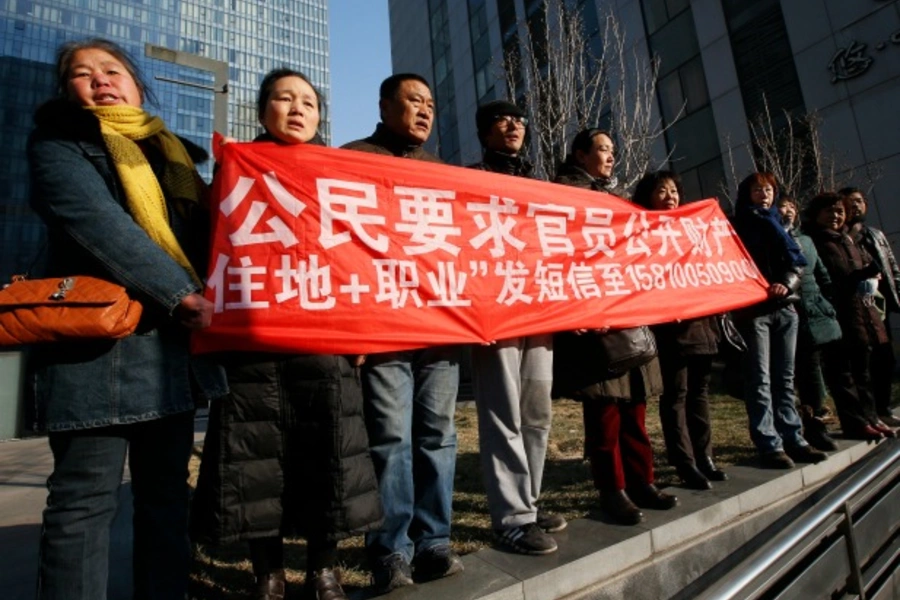Friday Asia Update: Top Five Stories for the Week of January 24, 2014

More on:
Darcie Draudt, Charles McClean, Will Piekos, and Sharone Tobias look at the top stories in Asia this week.
1. Report reveals that several of China’s top leaders hold trillions in offshore accounts. A new report by the International Consortium of Investigative Journalists (ICIJ) revealed nearly 22,000 tax haven clients from Hong Kong and mainland China. Among the confidential files cited, there are details of a real estate company co-owned by President Xi Jinping’s brother-in-law, and British Virgin Island companies set up by former Premier Wen Jiabao’s son and son-in-law. The report also states that PricewaterhouseCooper, UBS, and other Western banks have acted as middlemen aiding in setting up the offshore accounts. According to the report, “by some estimates, between $1 trillion and $4 trillion in untraced assets have left the country since 2000.” The ICIJ website is now blocked in China.
2. Postponement of elections until after February 2 ruled constitutional. On Friday, a Thai court ruled that Thailand’s elections, originally scheduled for February 2, can be postponed further, ruling that the Constitution “does not absolutely mandate that the election day cannot be rescheduled.” The court stated that extenuating circumstances can allow for such a postponement. The move has been labeled by some as a judicial coup d’etat, as it could create a power vacuum if no elections are held within the sixty-day period after the dissolution of the House of Representatives subscribed by the Constitution. The court’s ruling is seen as a victory for anti-government protesters, led by former parliamentarian Suthep Thaugsuban, who are seeking to supplant the current government with an unelected “people’s council.” Thailand’s pro-government “red shirt” activists have expressed their willingness to rise up if the elections are scrapped, setting up the prospect of further violence. Nine deaths have been attributed to the protests.
3. Chinese activist lawyer on trial. Xu Zhiyong, a human rights lawyer who campaigned against corruption, is on trial in China for “gathering crowds to disrupt public order.” Xu was a founding member of an informal grassroots group, New Citizens Movement, which demands that Chinese authorities follow the laws outlined in the country’s constitution. Xu also campaigned on behalf of inmates on death row and families affected by tainted baby milk formula in 2009. He was arrested in July 2013, and was previously under house arrest. CFR adjunct fellow and China legal expert Jerome A. Cohen said in an interview that it is unlikely that Xu will receive a fair trial, and “there is a kind of Alice in Wonderland absurdity to these proceedings.” Also this week, Chinese venture capitalist-turned-activist Wang Gongquan won release after being detained for four months, after he admitted to collaborating with another dissident standing trial. Wang, who made a fortune in real estate and Silicon Valley, began protesting against unofficial detention centers (also known as black jails) in 2011.
4. Indo-Australian relations deteriorate. Indonesia has stated it is beefing up naval patrols on its southern border, and the Indonesian Air Force has declared Australia to be “reachable.” The actions and statements come in the wake of “inadvertent” incursions by the Australian Navy into Indonesian sovereign waters, which occurred as Australia was trying to implement its aggressive policy to prevent asylum seekers. From Canberra, the policy appears to be working—in the first hundred days, boat arrivals have dropped by 80 percent. The Australian government has apologized for the intrusions, but Australian Immigration Minister Scott Morrison stated that there would be “no stepping back” from the country’s hardline policy despite rising tensions with Jakarta.
5. South Korean trade official returned following kidnapping in Libya. Han Seok-woo, head of the Tripoli branch of the Korea Trade-Investment Promotion Agency, was freed by security forces on Wednesday after being abducted by four gunmen three days prior. The gunmen stopped his car while Han was driving home from work. A South Korean Foreign Ministry official reported on Monday that no one has communicated why they have kidnapped him or what they wanted. Libyan officials identified the gunmen as members of a small armed group. Along with issuing a travel warning, the Korean Foreign Ministry has recommended the 551 South Korean nationals living in Libya leave the country.
Bonus: Hong Kong billionaire offers over $120 million to man able to convince his lesbian daughter to marry him. Hong Kong billionaire Cecil Chao offered HK$1 billion (US$128.8 million) to any man who was able to convince his daughter to marry him, despite the fact that she has a wife. His initial offer of HK$500 million attracted 20,000 potential suitors. However, daughter Gigi Chao said that no amount of money would be able to convince her to marry a man, but she “would be happy to befriend any man willing to donate huge amounts of money to [her] charity, Faith in Love.” British ‘Borat’ actor Sacha Baron Cohen is rumored to be planning a movie about Gigi Chao’s plight.
More on:
 Online Store
Online Store
